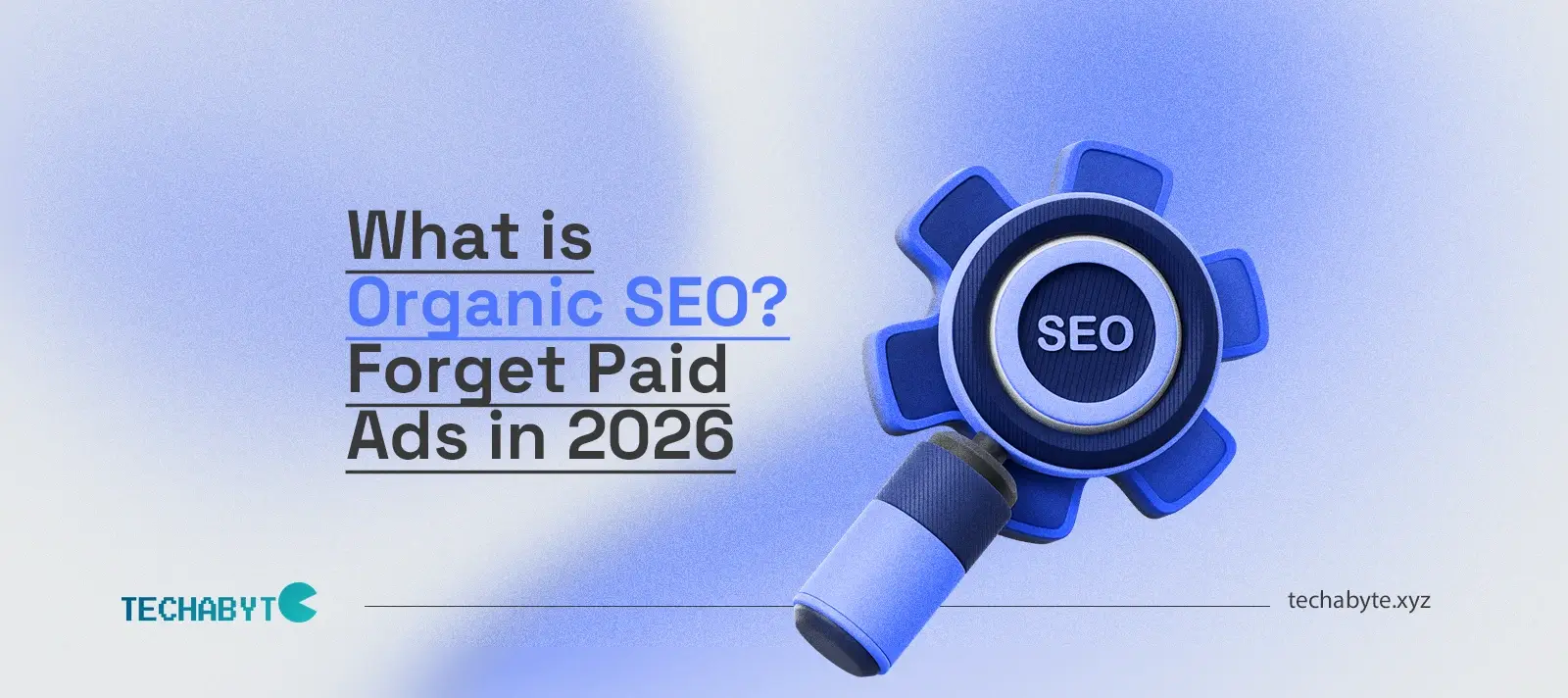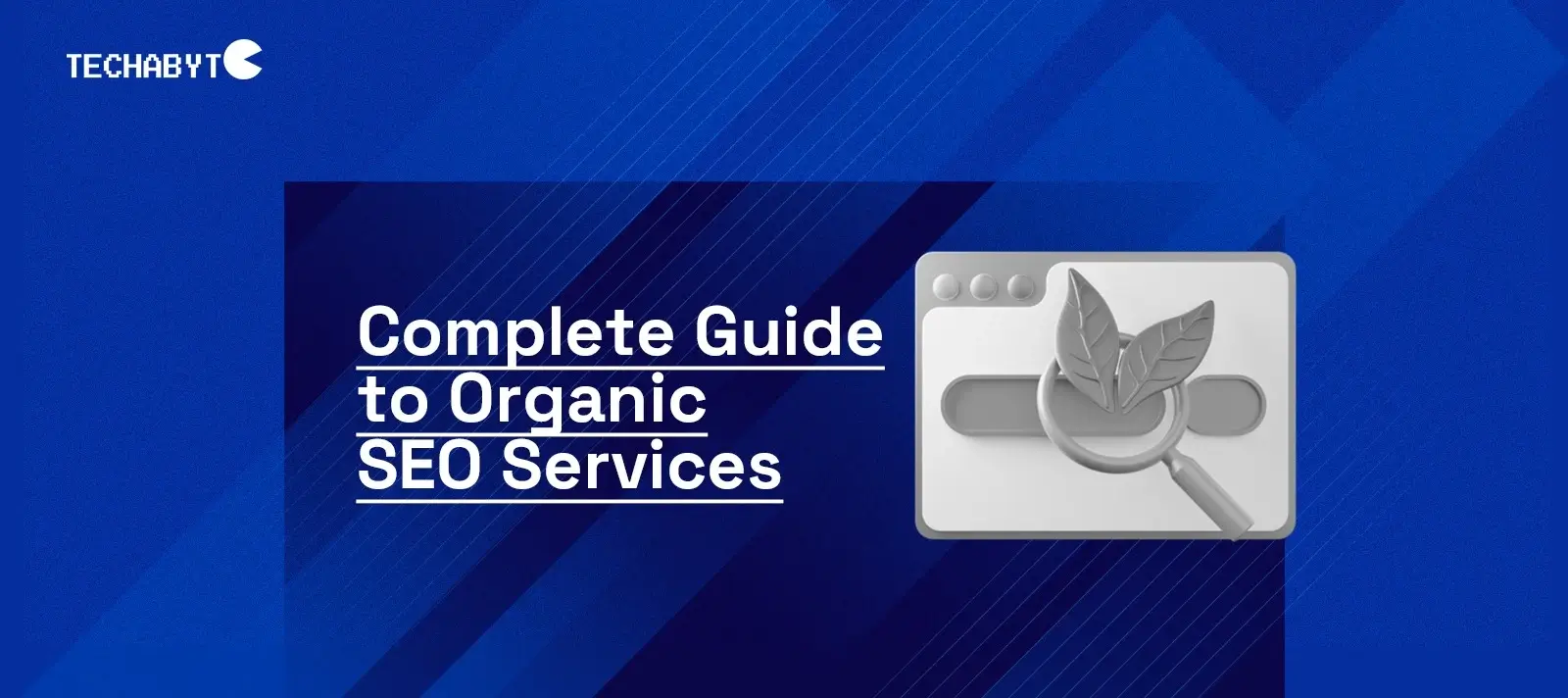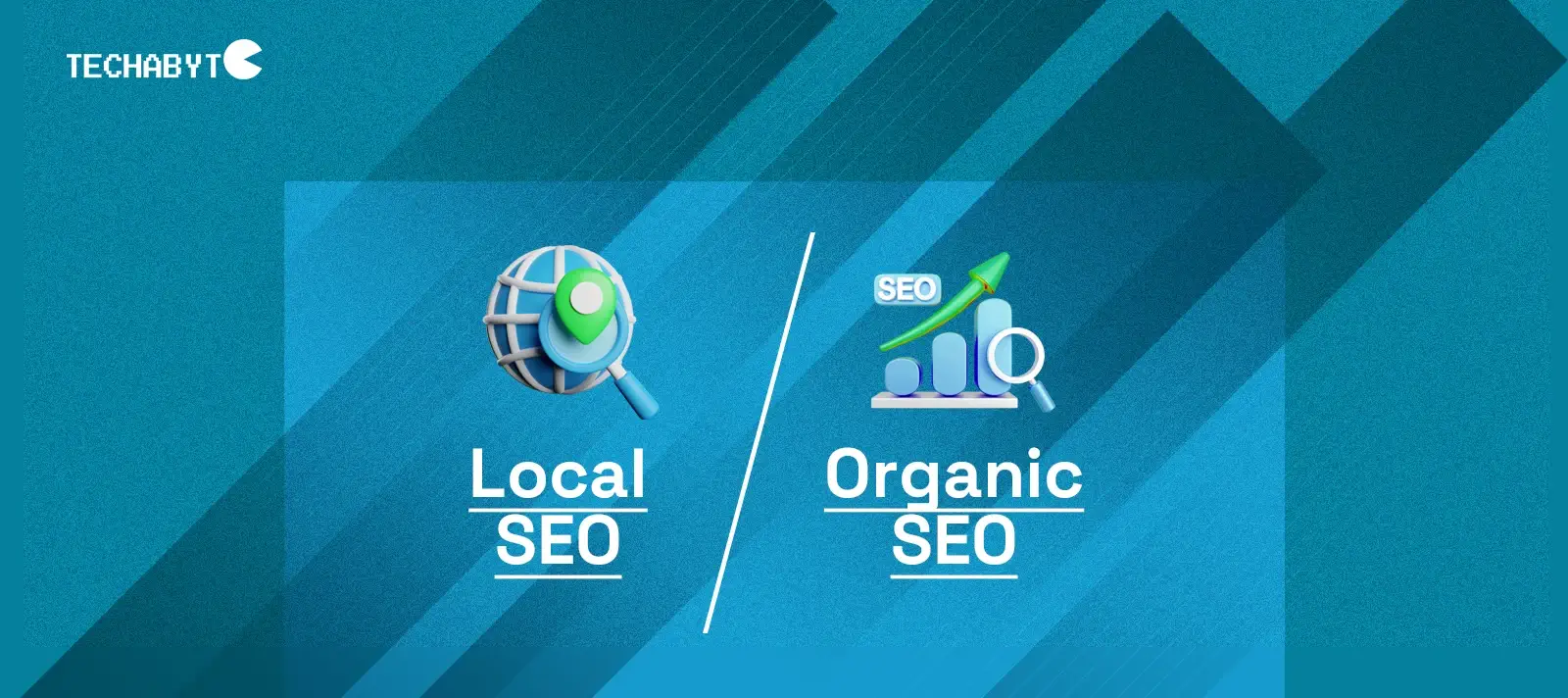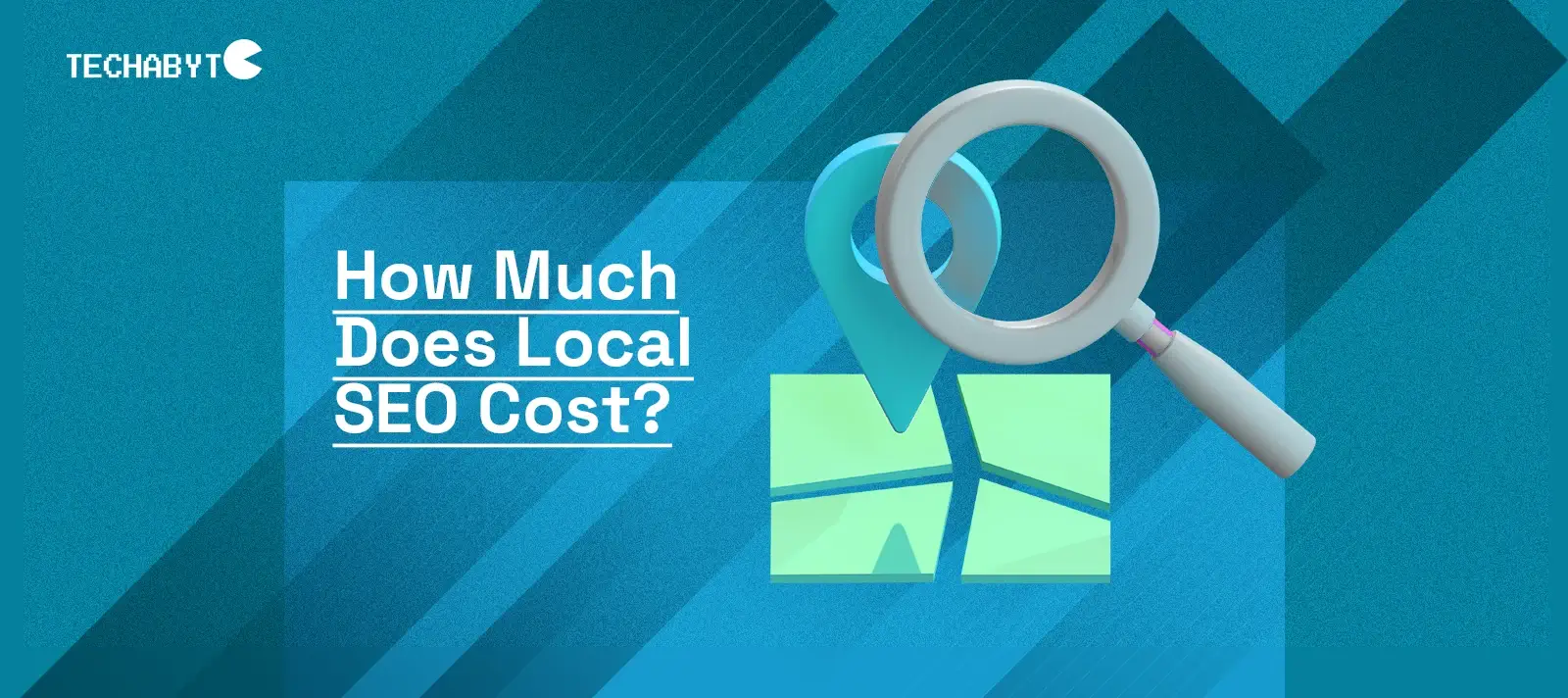Organic SEO is a process to rank your website content rank into search engines, matching user’s search intent organically. Organic SEO is divided into 3 types: On-page, OFF-page and Technical SEO. Organic SEO will prevail in the future marketing as it gives the foundation of indexability and authority of a website for long-term performance, and is still relevant in the era of AI search as without organic SEO, you won’t stand a chance with Generative Engine Optimization (GEO).
Key Takeaways:
- Organic SEO is an optimization strategy that ranks a website on search engines naturally, without paid ads.
- Organic SEO works simply matching user intents on search queries with high-quality, relevant content.
- Organic SEO is divided into 3 types: On-page SEO, Off-page SEO and technical SEO. The names suggest the nature, as on-page works inside the web content, off-page focuses on outside the website for online reputation, and technical SEO is more focused on site architecture, page speed, and overall performance issues.
- Organic SEO gives a solid foundation of a website’s core infrastructure, user experience and content range to gain free organic traffic, which is crucial for sustainable marketing.
- If you don’t have much time to read the full article, check out “The 10 tips to improve your organic SEO in 2026” section.
- Organic SEO is, and always will be relevant in the future, as it gives a strong search engine presence, indexability and crawlability to a website, which leads to new changes such as AI search.
What is Organic SEO in 2026?
Organic SEO is a search engine optimization strategy used to optimize and improve your website’s ranking on search engines like Google or Bing, organically. For example, an e-commerce store selling sofas & lounges can rank on SERP results when people search for “best L shaped sofas”.
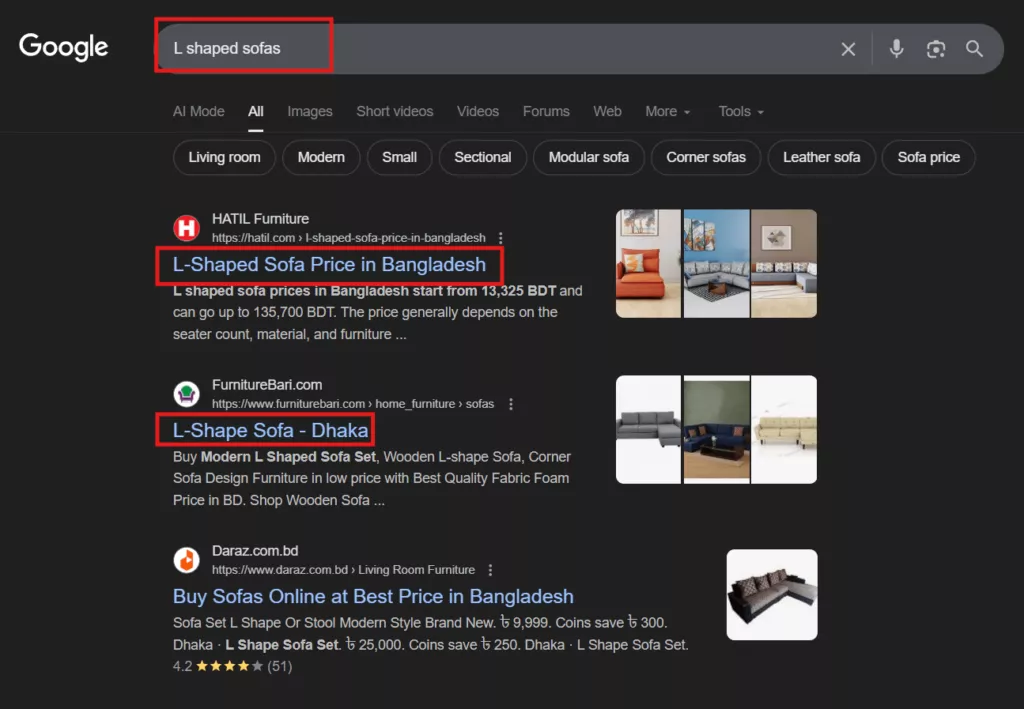
Unlike paid ads, organic SEO is completely free to rank your website onto SERP (search engine results page) to attract organic traffic. Paid ads, on the other hand, require pay-per-click for each traffic to show up on top of the SERP.
How does Organic SEO work?
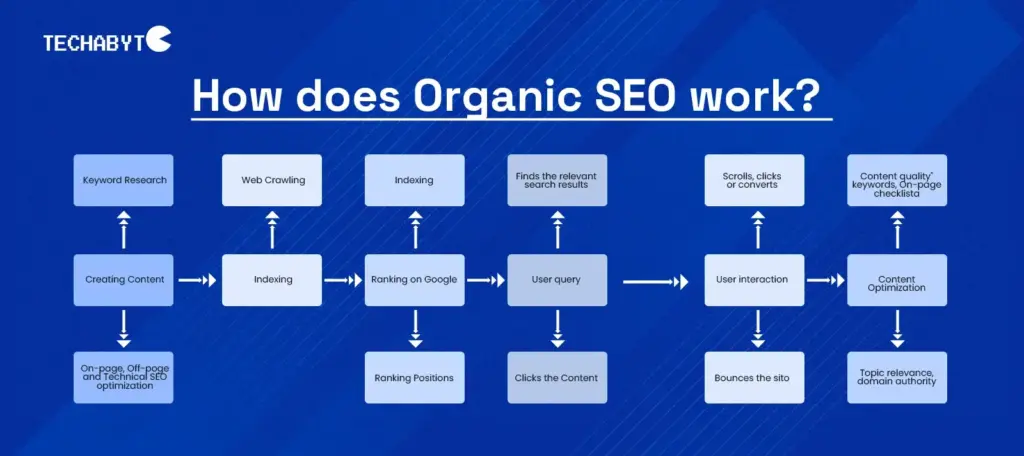
Organic SEO focuses on naturally improving your website or blog content on SERP rankings with organic searches. It involves aiming to rank with keywords that people with different user intents search with, which means your website or webpage meets their search query with high-quality, relevant content.
This requires efforts such as keyword research, content creation, optimizing webpages for search visibility on google and constantly observing ranking positions. This can be done by an SEO expert, or you can simply use popular SEO tools such as Semrush, Ahrefs, or plugins like Yoast SEO or Rankmath, etc. if you’re using a WordPress website.
However, in the competitive market, several factors are always considered in order to make your webpage or content stand out from the competitors on the SERP. These key factors are:
- Unique content: Which should be unique, helpful and meet the user’s query. Almost 89% of the content in the top 3 rankings on Google are unique.
- Topic relevance: Content should have high content relevance based on what the user is searching for.
- Domain authority: Google prioritizes if any other websites support your content with credible backlinks.
- Easy to surf: Check if your website is easy to explore, mobile-friendly, responsive, and fast-loading.
To ensure all the key factors are in place, the next topic shows how you can achieve them with different types of organic SEO.
What does Organic SEO include?
Organic SEO can be broken down into 3 types:
✅ On-page SEO
✅ OFF-page SEO
✅ Technical SEO
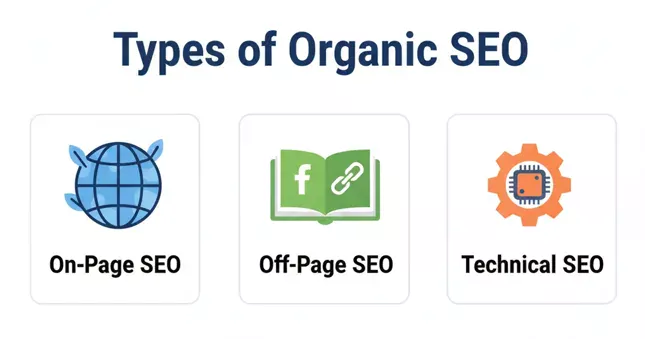
On-Page SEO: Optimize individual webpage on your site
On-page SEO is an organic SEO strategy that involves optimizing and improving web elements such as headers, meta titles, descriptions; HTML source codes like schema markup, alt texts, clean URLs, internal links and of course, the website content quality.
Here they are in a detailed breakdown:
- Headers & Meta Titles: Matching your title tags, meta descriptions, heading tags to inform google crawl spiders what the website content is about.
- HTML source codes: Optimizing the HTML source codes such as meta tags, schema markup, image alt-text, non-messy clean URLs support your content with a rich snippet and let google index crawling faster.
- Content Quality: Creating expert-quality content with visuals, statistics, relevant information that meets the user search queries and improves your topical authority on the subject.
- Internal linking: Supporting your rich content with other relevant content or webpage inside your website in case the user tends to dig deeper, which helps in topical authority as well.
Off-Page SEO: Improve brand visibility outside your website
Off-page SEO focuses on two things: domain authority and brand reputation. It involves collaborating with other websites for backlinks, adding local citations, improving brand mentions on social platforms, and publishing content on different publications to improve domain authority, which ultimately helps your content rank higher on SERP.
Here are the scopes of Off-page SEO:
- Credible Backlinks: Linking your high-quality content with popular websites to exchange backlinks, that improves on indexing as Google prefers credible content that is supported by industry-experts.
- Strong Citations: Establishing a strong online presence with online NAP (Name, Address, Phone Number) mentions on popular websites, local directories like (e.g., Yelp) and mapping apps like Google Maps.
- Local Business Profile: Building a local credibility on local searches using Google Business Profile that plays a key factor in organic SEO from a local perspective.
- Publishing Content on Platforms: Publishing relevant content on popular industry-specific publications that link back to your original content or the webpage.
- Brand Mentions: Monitoring brand mentions, hashtags, customer sentiments on social platforms, review sites, local directories that build a strong credibility about the brand and help bring more organic traffic.
Technical SEO: Make it an Easy-to-Navigate website
Technical SEO is a technical strategy to optimize a website’s infrastructure to improve its overall performance, making it easy for Google spiders to crawl & index. It requires optimizing structured data, technical elements, site speed, security, mobile-friendliness and fixing issues that help in ranking your content.
Here they are in a detailed manner:
- Overall Performance & Site Speed: Improving your website performance and site speed by optimizing codes, reducing file sizes, reducing redirect links (301) or error page (404), fixing crawl errors etc.
- Optimizing Structured Data: Adding or improving the structured data like adding schema markups on the HTML source code for Google to understand the brand information (including NAP).
- Improve crawlability and indexability: Using an easy-to-navigate, logical site structure with a structured sitemap (such as robot.txt and sitemap.xml) to ensure Google spiders what the website and its content layouts are about.
- Responsiveness & Mobile-Friendliness: Designing the site layouts to give a smooth responsive and mobile-friendly experience to users on the webpage.
- Remove Duplicate Content and Fix Canonicalization: Finding and fixing duplicate content issues and canonical tags if there’s a chance of multiple URLs with identical content patterns.
Why Organic SEO Is the Future of Sustainable Marketing
Organic SEO is important for your rankings because it allows websites to be visible on google search results for free. While paid ads stay at the top for a short period of time, organic SEO brings long-term, sustainable results with better click-through rates. And for marketing? Organic SEO is the stepstone of content marketing, which attracts customers with different channels, and organic channel/source is the one loved by all marketers.
And the best part? High-quality traffic with targeted user intent.
First Page Sage found astonishing results in their research that #1 organic search result can reach up to 39.80% where #1 paid ad results can be around 1.30%.
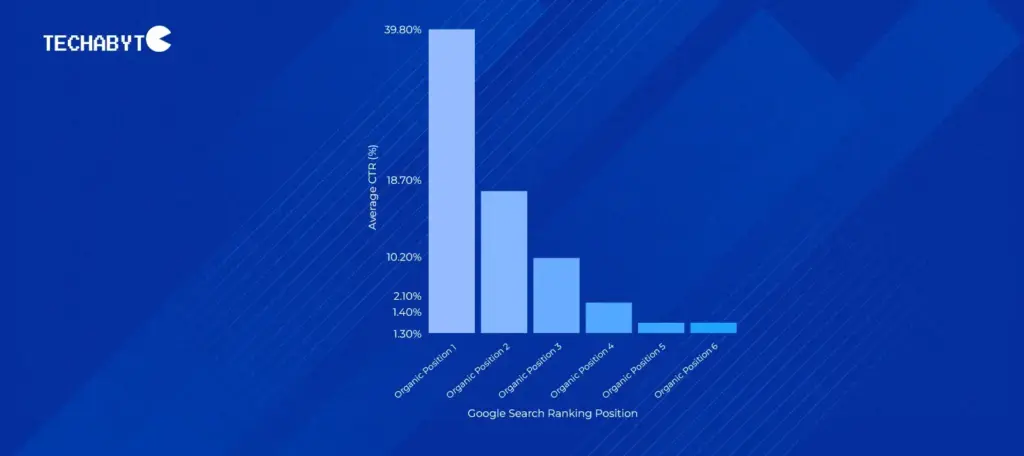
Techabyte, an OMNI Channel e-Business solution expert in Bangladesh, started its organic SEO journey, and within 6 months, our organic traffic rose up to 680%, ranking in total 119 keywords on different positions worldwide.

Even so, after analyzing 4 million Google search results for CTR trends by Backlinko, studies show that the “#1 result in Google’s organic search results has an average CTR of 27.6%.”
Is Organic SEO still Relevant in the AI Search Shift?
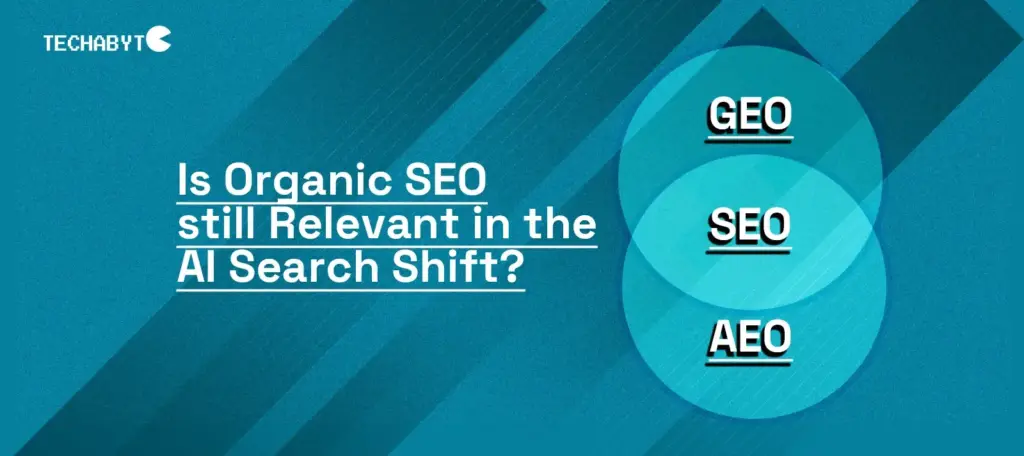
The world is shifting to AI-surge.
The paradigm of the ranking game has totally shifted, and we saw a massive downfall of organic traffic from the search engines, let alone clicks.
Even a few years ago, SEO experts used to compete to be in the top 10, now everyone is fighting to be cited on the AI Overview.
Because two big names have arrived: AEO and GEO.
AEO (Answer Engine Optimization) toppled the SEO playground just by introducing featured answers directly pulled from your website content without any need for clicks. If you’re playing the general SEO rules, you’re good enough to be featured by the answer engine for rich snippets.
But GEO has changed the entire play!
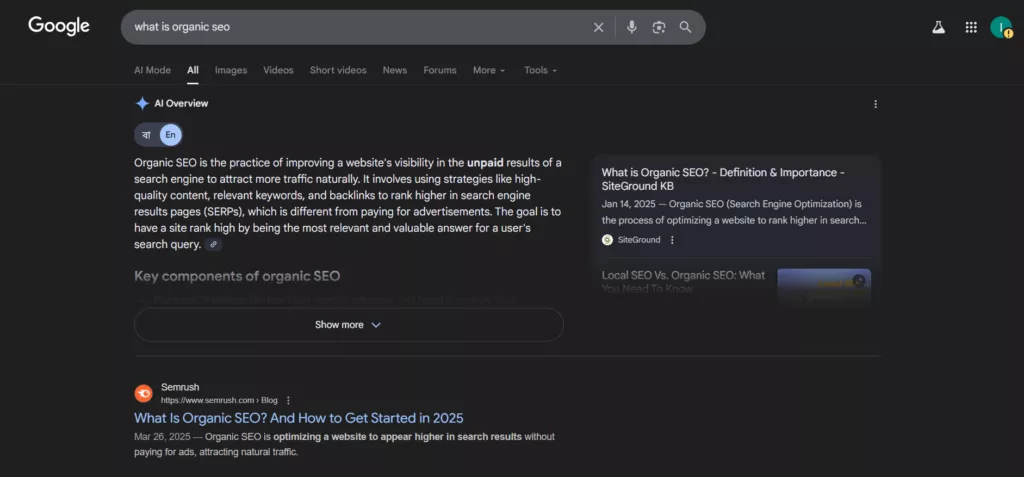
Notice Semrush there? Imagine how many clicks they would’ve gained if the AI overview wasn’t summarizing the queries.
Generative Engine Optimization is now dominating the SERP, pushing SEOs to optimize their contents to train AI models, in order to generate answers while citing the content itself.
Now, it’s no longer about clicks or ranks, but awareness.
Because no matter how your content is ranking, AI-generated answers will summarize and cite if your content offers high-value information.
But is organic SEO still in the play? Short answer, yes.
GEO still relies on the fundamentals of organic SEO such as On-page, Off-page or technical SEO, but is now introducing a new metric: LLM visibility.
Basically, organic SEO will help you get to the stage where your content can be eligible to be cherry picked by AI models.
Here’s another example: “AI is even more reliant on a proper H1-H6 heading hierarchy than traditional search engines to understand content relationships and structure.”
Based on context, trustworthiness, conversion-friendliness and content structure, large language models are now selecting the suitable contents from any ranking and summarizing it with a clear and concise AI overview or an AI-generated answer.
So, everything about organic SEO is still on, however you might have to follow a few crucial steps:
🤖 Adjust your SEO strategy based on visibility, not clicks.
🤖 Create unique content that can fit to be a summary of AI overview.
🤖 Focus on growing direct traffic instead of organic traffic, so having an Off-page SEO strategy is a must.
🤖 Add branded-search, visibility score and brand mentions to the KPI list.
🤖 Run prompts across different AI models such as ChatGPT, Perplexity, Gemini and see if your brand is mentioned, and compare the direct traffic on GA4 and Google Search Console.
10 tips to improve your organic SEO in 2026
Getting on organic SEO for your website is easy. However, implementing an organic SEO strategy requires time & effort for long-term results. Here’s a quick short list on how you can improve your organic SEO in 2026:
- Do Keyword Research, starting from low-difficulty keywords.
- Make a Content Pillar with Keyword and Topic Clusters.
- Try to write unique, helpful contents (not copying from other blogs).
- Optimize each page for On-Page SEO.
- Outreach to industry-expert publishers to exchange backlinks.
- Get listed on directories, citations and guest-blogging for Off-page SEO.
- Reduce error pages, and fix crawl errors with a fine site architecture.
- Monitor your ranking keywords daily using GA4, Search Console etc.
- Focus on page speed and structured data to let Google crawl better.
- Try ‘Semantic SEO’ instead of matching keywords.
Frequently Asked Questions:
✅ Is organic SEO still relevant in AI and paid ads?
Yes, although organic SEO focuses on organic traffic, it builds the foundations for the web content with on-page, off-page and technical SEO to improve in indexability which helps AI-models to find the right content, train and summarize search queries. As for the paid ads, the organic SEO helps in building credibility of the brand that ultimately pushes the users to click.
✅ Can small businesses compete with big brands using organic SEO?
Yes, but in a long-term marathon. Organic SEO is a time-lengthy effort, and requires a right strategy (such as ranking on low-difficulty keywords or targeting a small niche) to slowly grab a stronghold in the keyword positions among the big brands. Although key metrics like domain authority, backlinks, social searches help big brands to rank on SERP, small businesses always has potential to outrank a giant with organic SEO.
✅ Does organic SEO work for every industry?
Any industry that requires an online presence and has a huge market of users surfing online looking for the same industry needs organic SEO. Whether you’re in healthcare, home construction, e-commerce or digital marketing industry: organic SEO plays a vital role in building your brand presence and domain authority.
✅ How often should SEO content be updated?
It depends on how frequently you post SEO content and how they perform. With the right amount of quality, uniqueness and relevance, high-traffic content needs to be updated every 3-6 months while blogs can be updated every 6-12 months. That being said, your content needs to be monitored once or twice a month to see if there’s any change in the keyword trends, and prioritize low-performing content to update and improve organic traffic.
✅ How can I tell if my organic SEO is actually working?
By using the right key performance indicators (KPI), you can track & monitor how organic SEO is performing on your website. For instance, you can track KPIs such as organic traffic, impressions, click-through rate, keyword rankings, bounce rate, average session duration, page speed to see how well your content or website is performing on organic SEO.
✅ Is there any risk involved with organic SEO?
Yes, poor execution and using unethical means (e.g., black-hat SEO, buying backlinks, fake reviews, keyword stuffing) can lead to severe penalties from search engines that might permanently damage your website. Even search algorithm updates can lead to drop on organic SEO, so there is risk involved. However, with the right strategy & execution in place, you can avoid these issues and readjust to algorithmic changes.
✅ How does user experience (UX) influence organic SEO?
Google now prioritizes content that helps audiences in getting the best user experience on search. That involves technical SEO to play vital roles in design, site architecture, source codes to be optimized to influence organic SEO. By contrast, poor loading speed, messy mobile-responsiveness, or low-quality content can slow down UX which hampers organic SEO.
✅ Can social media impact organic SEO rankings?
Not directly, although social media plays a key role in building trust, credibility and help in key metrics like direct traffic, brand mentions, social signals and more backlinks. As Google is integrating more social content into search results, having high-value content on social sites can drive high traffic, which signals to search engines that your domain is valuable and relevant.
✅ How does organic SEO differ from content marketing?
Content marketing is an approach to create high-value content to attract and convert human users, while organic SEO focuses on optimizing & ranking a website and its content on search engine results page (SERP). In short, content marketing helps build a content strategy to convert customer audiences while organic SEO makes sure your content is found by them in the first place.
Wrapping Up!
Although AI search is going to shape the traditional search by 2028, organic SEO will always have a stronghold in optimization strategy, just reshaped in a new face.
If you don’t have time or need a helping hand to rank your contents in 2026, Techabyte is more than happy to assist in any way. Feel free to message us for any questions or a free strategy consultation meeting, anytime.

